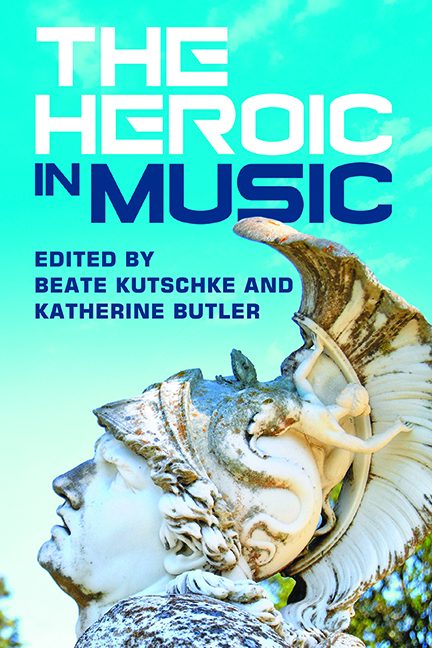Book contents
- Frontmatter
- Contents
- List of Illustrations
- Notes on Contributors
- Introduction
- Part I The Configuration of Heroic Music as a Tool for Shaping Moral and Political Identity
- Part II Music, its Ethics and Politics – Beyond ‘Beethoven Hero’
- Part III Heroic Music and its Moralities in Dictatorships and Post-Heroic Democracies
- Bibliography
- Index
11 - ‘Someone to Save the Day’: Popular Music, Springsteen, and the Circle of Hero Production
Published online by Cambridge University Press: 16 July 2022
- Frontmatter
- Contents
- List of Illustrations
- Notes on Contributors
- Introduction
- Part I The Configuration of Heroic Music as a Tool for Shaping Moral and Political Identity
- Part II Music, its Ethics and Politics – Beyond ‘Beethoven Hero’
- Part III Heroic Music and its Moralities in Dictatorships and Post-Heroic Democracies
- Bibliography
- Index
Summary
‘You said heroes are needed, so heroes get made’ sings Bruce Springsteen in ‘Devil's Arcade’ (2007), and indeed, heroes are not born, they are produced. The extraordinary deed needs a witness to become known and to be credible for the public. Odysseus and Homer, the hero and his poet, form an inseparable pair. Heroes have to be sung about to become what they are and their poets’ songs need an audience that is fascinated by them and recognizes the deeds they sing of as heroic. They are the product of a system of communication and dependent on the media that spread their fame, be it an oral narrator like Homer or the internet. As Lance Strate has pointed out: ‘different kinds of communication will result in different kinds of heroes’. Strate writes that the invention of writing and the printing press changed the concept of societies’ ideas of heroes as well as modern electronic mass media: photography, sound recording, cinema, TV, and the internet. Thus, he differentiates oral, typographic, and electronic heroes. However, it is not only changes in media that impact on ideas of heroism as Strate suggests, but the addressees and their societies also develop and bring forth new media and new heroes. Communication is circular, and changes in any one part of a communication circle create changes in the others. The hero and his deed, his medium and its addressees define points in a communication system that interact and are interdependent.
Modern societies are composed of a great number of highly differentiated communication systems that use a broad spectrum of media. Therefore, we should not be surprised that the classical warrior hero of oral tradition has become a rare species outnumbered by much more ordinary protagonists of printed novels or movies, and beyond fiction by athletes, pop stars, or TV personalities, or by people who engage in charities or work for their neighbourhood. Heroes have not died out, as Daniel J. Boorstin in his 1961 book The Image bemoans. The word, however, has changed its meanings and now encompasses a broad spectrum of ideas about what a hero is – dependent on the context in which the label is used.
- Type
- Chapter
- Information
- The Heroic in Music , pp. 207 - 224Publisher: Boydell & BrewerPrint publication year: 2022



